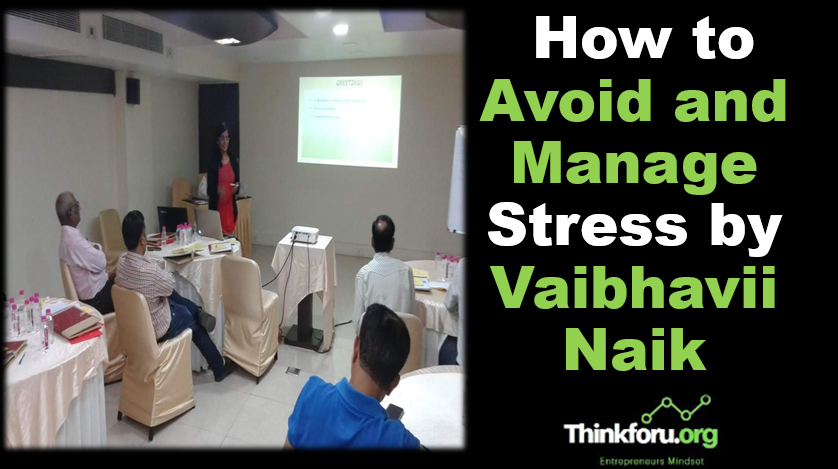How to Avoid and Manage Stress by Vaibhavii Naik
How to Avoid and Manage Stress
 |
| Cover Image of How to Avoid and Manage Stress by |
Read More :
>> Subtlety Sneaking in Stress How to Manage Stress By Vaibhavii Naik
>> Eustress vs Distress What can be positive about stress by Vaibhavii Naik
Stress is a common part of
everyone's life, and while a certain amount of stress can be motivating, too
much of it can lead to physical and mental health problems. Learning how to
avoid and manage stress can help you live a happier and more fulfilling life.
Avoiding
Stress
One of the best ways to manage stress is to avoid it in the
first place. Here are some tips to help you avoid stress:
●
Prioritize:
Make a list of your most
important tasks and focus on completing them first. This will help you avoid
feeling overwhelmed.
●
Learn to say no:
Saying yes to everything can
lead to overcommitment and stress. It's important to learn to say no when you
need to.
●
Get enough sleep:
Lack of sleep can lead to
irritability, anxiety, and stress. Aim for at least seven hours of sleep each
night.
●
Take breaks:
Take regular breaks
throughout the day to rest and recharge. Even a few minutes of relaxation can
help reduce stress levels.
Managing
Stress
If you are
experiencing stress, there are several things you can do to manage it:
●
Exercise:
Exercise is a great way to
reduce stress levels. It releases endorphins, which can improve your mood and
reduce anxiety.
●
Practice relaxation techniques:
Meditation, deep breathing,
and yoga can help reduce stress and anxiety.
●
Get social support:
Spending time with friends
and family can provide emotional support and help reduce stress levels.
●
Stay organized:
Being organized can help
reduce stress levels. Make to-do lists and keep your workspace tidy.
●
Take care of yourself:
Eating a healthy diet,
getting enough sleep, and engaging in activities you enjoy can help reduce
stress levels.
Being Happy
in Spite of Stress
Besides, it's equally important to remember that stress is a
part of modern life, and it's impossible to completely avoid it. However,
learning to be happy in stress can help you maintain a positive outlook and
enjoy life even during difficult times. Here are some tips for being happy in
stress:
●
Practice gratitude:
Focusing on the positive
aspects of your life can help reduce stress levels and improve your overall
happiness.
●
Maintain perspective:
Try to maintain perspective
during stressful times. Ask yourself if the situation is really as bad as it
seems.
●
Find joy in small things:
Finding joy in small things, like a cup of
coffee or a beautiful sunset, can help you maintain a positive outlook.
●
Engage in self-care:
Engaging in self-care activities, like taking
a bubble bath or going for a walk, can help reduce stress levels and improve
your mood.
Being
Resilient in the Face of Adversities
Being resilient in the
face of adversity is a valuable skill that can help individuals overcome
challenges and bounce back stronger. Resilience involves the ability to adapt,
persevere, and maintain a positive outlook during difficult times. Here are
some strategies to develop resilience, along with examples:
●
Cultivate a positive mindset:
Resilient individuals tend to have a positive
outlook, even in the face of adversity. They focus on possibilities and
maintain a belief that they can overcome challenges. For example, if someone
loses their job, they might view it as an opportunity to explore new career
paths or develop new skills.
●
Build a support network:
Having a strong support system is crucial in
times of adversity. Resilient people seek support from friends, family, or
support groups, which can provide emotional support, advice, and encouragement.
For instance, someone going through a difficult breakup may lean on their close
friends for support and guidance.
●
Set realistic goals and take
proactive steps:
Resilient individuals set realistic goals and
break them down into manageable steps. They focus on what they can control and
take proactive actions towards their goals, even when facing setbacks. For
instance, if someone experiences a setback in their business venture, they may
reassess their strategy, learn from their mistakes, and take deliberate actions
to move forward.
●
Foster problem-solving skills:
Resilience involves being able to analyze
problems and find effective solutions. Resilient individuals develop
problem-solving skills and adopt a flexible approach to overcoming obstacles. For
example, if someone faces a financial crisis, they may seek advice from
financial experts, explore alternative income sources, or create a budget to
manage their expenses more effectively.
●
Practice adaptability:
Resilient people are adaptable and embrace
change. They recognize that life is full of uncertainties and are willing to
adjust their plans and perspectives accordingly. For example, if someone
experiences a career setback, they may explore different industries or consider
changing their career path altogether to adapt to the evolving job market.
●
Learn from failures and setbacks:
Resilience involves seeing failures and
setbacks as opportunities for growth and learning. Resilient individuals
analyze their experiences, identify lessons learned, and use them as stepping
stones for future success. For instance, if someone's relationship ends, they
may reflect on the experience, identify patterns or behaviors that contributed
to the breakup, and work on personal growth and self-improvement.
Final
Thoughts
Stress is a part of life, but it doesn't have
to control your life. Learning to avoid and manage stress can help you live a
happier and more fulfilling life. Remember to take care of yourself,
prioritize, and maintain perspective, and you'll be on your way to a happier
and healthier life. Also, building resilience takes time and practice. It is a
skill that can be developed and strengthened over time, allowing individuals to
navigate adversities with greater ease and bounce back from setbacks.



